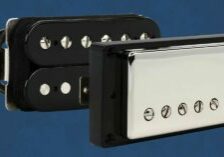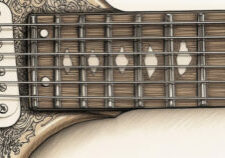Nothing is more frustrating than unwanted buzz coming from your strings. Luckily, there are some obvious common causes of guitar string buzz.
So let’s dive in! Say goodbye to that buzzing and hello to smooth, pristine sounds.
Key Takeaways
- Improper fretting technique can lead to guitar string buzz.
- Incorrect string height on the fretboard can cause guitar string buzz.
- Frets can lift from the wooden neck will cause buzzing.
- Worn or damaged frets can be a common cause of guitar string buzz.
- Inadequate nut slots can contribute to guitar string buzz.
- A poorly installed bridge or saddle can cause buzzing.
Improper Fretting Technique
Before you start adjusting your guitar, you should realize that pressing too hard on the strings can lead to improper fretting technique. Finding the right balance of pressure is crucial for clean and accurate playing.
When you press too hard, it not only strains my fingers but also causes the strings to bend out of tune. Additionally, excessive pressure can result in unwanted string buzz, as the strings may touch neighboring frets.
Incorrect String Height
You can experience string buzz when the strings on the guitar are too low on the fretboard. This is a common issue that can occur because many of us like to set up our guitars with a low action, so its easy to be “too low.”
When the strings are set too close to the frets it will cause them to vibrate against the frets when played.
To fix it, adjust the action of on your guitar by raising the strings slightly by adjusting either the individual saddle of the buzzing string or raising the entire bridge. Start with small adjustments, then play it to see if this removes the buzzing sound, then repeat if necessary.
Lifted Frets
Frets can become lifted or lifted due to a variety of reasons, such as changes in temperature and humidity, excessive string tension, or the natural wear and tear of the instrument. When frets lift, it can cause buzzing or rattling sounds when playing certain notes, making it difficult to achieve a clean and smooth sound.
The easy fix is to tape off the area around the suspected high-lifted fret and lightly and carefully tap on the fret with a small hammer. If that doesn’t work, you can have a guitar technician reseat or replace lifted fret.
Worn or Damaged Frets
Excessive wear on the frets can lead to buzzing and hinder the playability of the guitar. Frets that have experienced excessive wear can become uneven, resulting in strings contacting multiple frets at once and producing an undesirable buzzing sound.
Additionally, divots or dents in the frets can cause the strings to catch or vibrate unevenly, leading to buzzing. If buzzing issues persist despite proper setup and technique, then it may be necessary to have the frets professionally repaired or replaced.
Inadequate Nut Slots
I try to cut my nut slots fairly deep, but its easy to go too deep. If the nut slots are too deep, the strings can buzz against the first few frets, resulting in a poor sound quality.
This isn’t a common issue that just occurs over time. This will normally only happen when you are cutting a new nut. I usually just trash the nut and start over.
Inadequate Bridge or Saddle Setup
The bridge and saddle on your guitar needed to be properly aligned and seated in order to make your guitar playable. Otherwise, you will have all kinds of problems, including string buzz.
Normally string buzz from the bridge will only occur when you first install a bridge. Its not likely to be a problem that just appears out of nowhere. Saddles can sometimes get twister or unseated when changing strings. Sometimes the strings aren’t sitting in the correct spot on the saddle which can cause string buzz.





